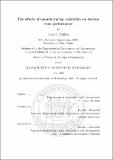The effects of manufacturing variability on turbine vane performance
Author(s)
Duffner, John D.
DownloadACDL_TR-08-1.pdf (1.085Mb)
Metadata
Show full item recordAbstract
Gas turbine vanes have airfoil shapes optimized to deliver specific flow conditions to turbine rotors. The limitations of the manufacturing process with regards to accuracy and precision mean that no vane will exactly match the design intent. This research effort is an investigation of the effects of manufacturing-induced geometry variability on the performance of a transonic turbine vane. Variability is characterized by performing Principal Components Analysis (PCA) on a set of measured vanes and then applied to a different vane design. The performance scatter of that design is estimated through Monte Carlo analysis. The effect of a single PCA mode on performance is estimated and it is found that some modes with lower geometric variability can have greater impact on performance metrics. Linear sensitivity analysis, both viscous and inviscid, is carried out to survey performance sensitivity to localized surface perturbations, and tolerances are evaluated using these results. The flow field is seen to be practically insensitive to shape changes upstream of the throat. Especially sensitive locations like the throat and trailing edge are investigated further through nonlinear sensitivity analysis.
Date issued
2008-06Publisher
Aerospace Computational Design Laboratory, Dept. of Aeronautics & Astronautics, Massachusetts Institute of Technology
Series/Report no.
ACDL Technical Reports;ACDL TR-08-1